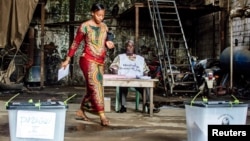People in Guinea are awaiting results from Saturday's parliamentary elections, which officials say were marked by heavy voter turnout.
Guinea's electoral commission says it appears more than 80 percent of eligible voters cast ballots Saturday, despite some logistical problems in the capital, Conakry.
The elections are considered the last step in Guinea’s transition from military dictatorship to civilian rule. President Alpha Conde won a close presidential election in 2010, two years after army officers took power in a coup.
The commission says it will being releasing partial results no later than Tuesday.
The Economic Community of West African States sent an observer team to Guinea. Edem Kodjo, who heads the mission, said the elections took place in "acceptable conditions" with regards to freedom and transparency.
"The shortcomings noted do not visibly stem from any deliberate act that could call into question the integrity of the electoral process," he said. "These shortcomings stemmed from a misunderstanding of procedures on the part of electoral workers or logistical problems. These shortcomings did not prevent citizens from voting freely."
While there were complaints about long lines Saturday, voting was calm.
Some 1,700 candidates are seeking the 114 seats in the National Assembly, which will replace a transitional council.
Guinea's parliamentary polls had been repeatedly postponed for more than two years because of disputes in organizing the polls and violence between political parties.
Leading up to Saturday's vote, at least one person was killed and dozens more injured in campaign clashes in the West African nation.
Guinea's electoral commission says it appears more than 80 percent of eligible voters cast ballots Saturday, despite some logistical problems in the capital, Conakry.
The elections are considered the last step in Guinea’s transition from military dictatorship to civilian rule. President Alpha Conde won a close presidential election in 2010, two years after army officers took power in a coup.
The commission says it will being releasing partial results no later than Tuesday.
The Economic Community of West African States sent an observer team to Guinea. Edem Kodjo, who heads the mission, said the elections took place in "acceptable conditions" with regards to freedom and transparency.
"The shortcomings noted do not visibly stem from any deliberate act that could call into question the integrity of the electoral process," he said. "These shortcomings stemmed from a misunderstanding of procedures on the part of electoral workers or logistical problems. These shortcomings did not prevent citizens from voting freely."
While there were complaints about long lines Saturday, voting was calm.
Some 1,700 candidates are seeking the 114 seats in the National Assembly, which will replace a transitional council.
Guinea's parliamentary polls had been repeatedly postponed for more than two years because of disputes in organizing the polls and violence between political parties.
Leading up to Saturday's vote, at least one person was killed and dozens more injured in campaign clashes in the West African nation.









